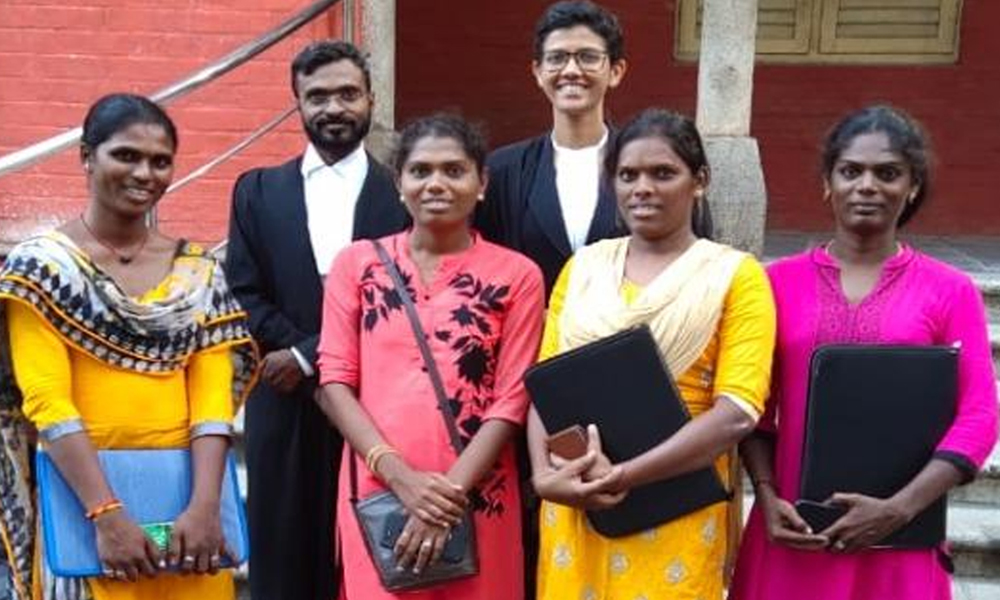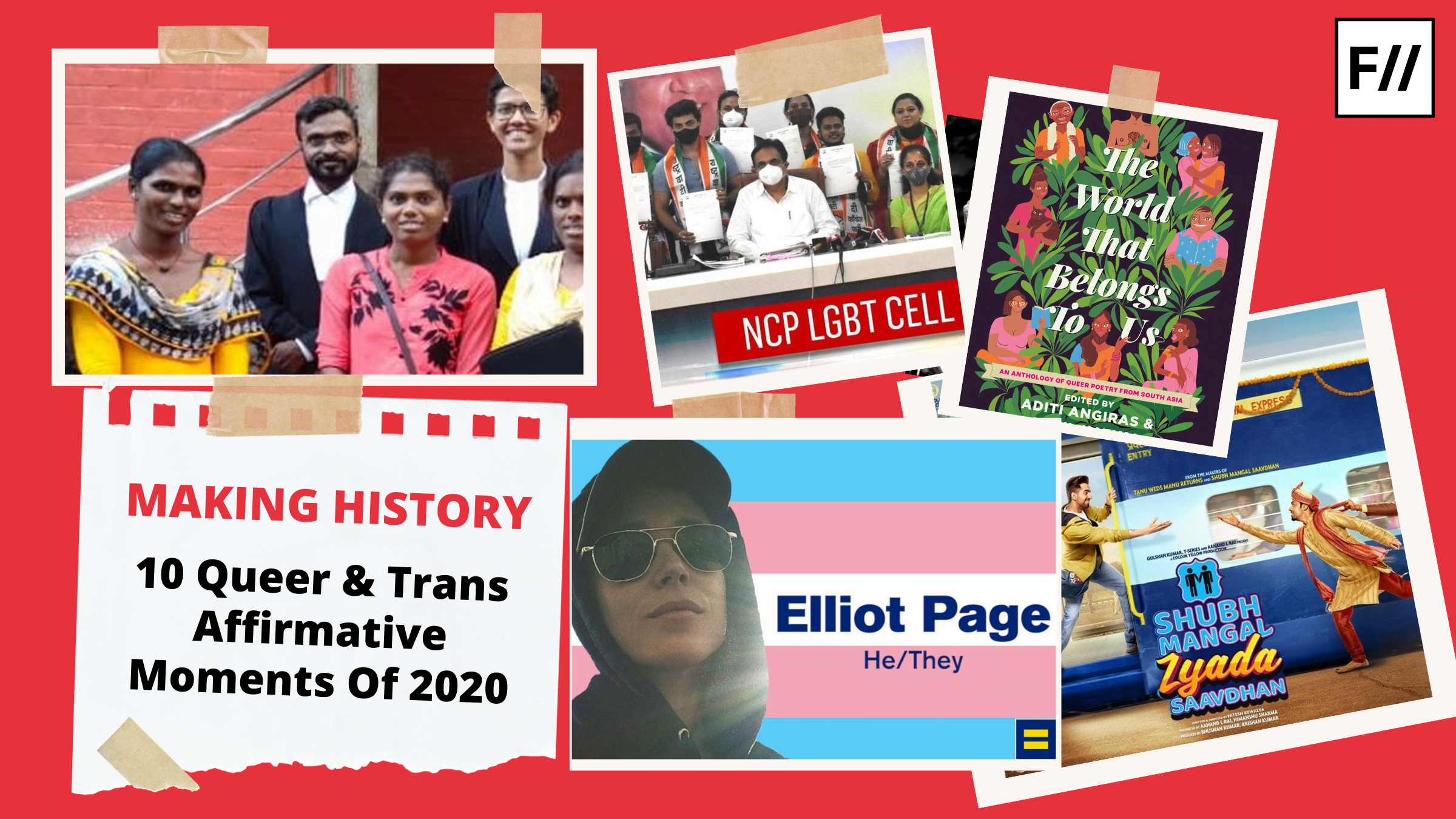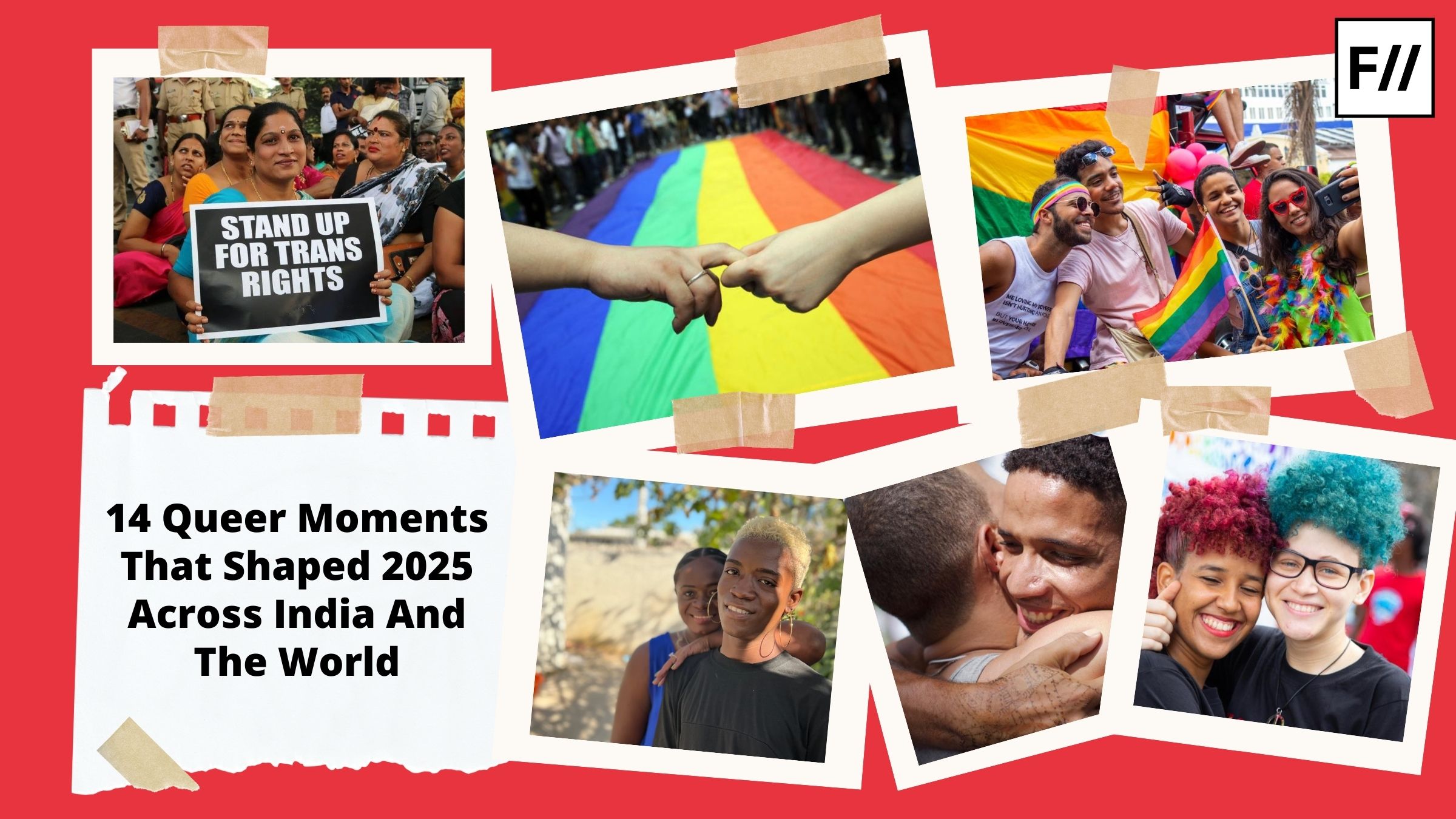The year 2020 has not been an easy year for any of us. For queer and trans people, who are among the communities that have already been marginalised, neither the discrimination took a backseat nor did they themselves give up. All of it: from the protests against queer-negative policies and laws such as the Trans Act, media representations, love, solidarity and support for each other, fund-raising for queer and trans people in distress–everything co-existed in full glory, making 2020 one of the most remarkable years in showing the solidarity of the queer and trans community in the face of challenges.
This is the year that truly unleashed the essence of the slogan, ‘We are here, We are Queer, and we are not going anywhere.’
To commemorate the same, here is looking at the historic moments for the queer and trans community from the year 2020.
Also read: 5 Quotes From Trans Activists That Will Inspire Your Feminist Activism
- Tamil Nadu government granted an age limit relaxation for trans people applying for employment in police services.

The Home Department of the Tamil Nadu government has granted age relaxation for transgender persons applying for posts in the state’s police subordinate services.
As reported by The News Minute, the government order comes following a writ petition filed by K Aradhana, a trans woman, in 2018. Aradhana was 29 years old when she tried to apply for recruitment online and her application was denied because she had surpassed the prescribed age limit of 26. The court, in its interim order, directed the recruitment board to keep one post vacant and to accept the application of the petitioner, regardless of the age, subject to the result of the writ petition.
The Supreme court order had stated that since the transgender community faces discrimination, prejudice, and violence from various sections of the society, they should be given age relaxation similar to what marginalised groups get. Now, the guidelines will be similar to that of Scheduled Caste and Scheduled Tribe candidates, who apply for the recruitment through the Tamil Nadu Uniformed Services recruitment board.
- Bollywood released a coming of age queer romantic comedy love story.
The pandemic clearly affected our sensible functioning and performance, and from the looks of it, Bollywood wasn’t immune to that either. The portrayal of queer and trans people on the Bollywood big screen only went downhill as we moved forward this year.
However, in January 2020, a one-of-its-kind Bollywood romcom ‘Shubh Mangal Zyada Saavdhan’ was released on the big screen. This movie needs to be credited for attemptting to normalise queer love stories, two men kissing on-screen, a mainstream Bollywood hero playing a ‘gay’ character, and not turning representation into caricaturistic. The film, written and directed by Hitesh Kewalya, featured Ayushmann Khurrana, Jitendra Kumar, Neena Gupta, and Gajraj Rao.
3. A rise in queer-affirmative counseling services.
The unanticipated crisis was a reminder that our mental health does not exist in a vacuum and needs to be taken care of, irrespective of a pandemic. For queer and trans people, reaching out to mental health and counselling services during this pandemic is particularly tricky as it is not only about having access, information, or means of affordability, but also finding a counselor or therapist who is ‘queer-affirmative’. Ironically, it is not the default practice of mental health professionals but a ‘rare specialisation.’
For queer and trans people, reaching out to mental health and counselling services during this pandemic is particularly tricky as it is not only about having access, information, or means of affordability, but also finding a counselor or therapist who is ‘queer-affirmative’.
Mariwala Health Initiative trained 150+ mental health professionals (MHPs) across nearly 10 cities on queer-affirmative counseling practices (QACP). The QACP-trained cohort of MHPs made strong statements against conversion treatment and generated a bunch of resources during this year’s Pride month.
The popularisation of and emphasis on queer-affirmative counseling is important as that not only instills confidence in the practitioners but also in the beneficiaries when they seek help. Mental health professionals offered free/sliding scales for counseling queer and trans people, initiatives like Ya All provides support to LGBTI/queer people in Manipur- parts of north-east India, Nazariya started weekly zoom calls with queer women and trans persons, Arise helpline was initiated to provide free mental health care to queer and trans people in distress, Pink List India published a comprehensive list of queer affirmative mental health practitioners.
- Nationalist Congress Party forms an LGBTQ++ cell in Maharashtra.
The Nationalist Congress Party (NCP) on Monday formed an LGBTQ cell within the party framework, becoming the first political party in the country to set up an independent wing to work on the issues facing the homosexual, queer, bisexual, transgender community.
Priya Patil, the trans woman activist appointed as the state unit head for the cell, said that the formation of this cell as a branch under a political party is a significant step in the fight to claim equal rights. “We will be raising our voices for the welfare and betterment of the community and work to ensure equal rights for them,” she said.
- Noida: Metro station dedicated to transgender persons renamed as ‘Rainbow Station’.
The Noida Metro Rail Corporation (NMRC) named sector 50 Metro station ‘Rainbow station’ to spread awareness about the protection of transgender people’s rights. They colored the pillars in rainbow colors that signify the pride of queer and trans persons and LGBTQI+ social movements. NMRC promised to provide transgender persons with employment opportunities to ensure self-sustenance.
Initially, the NMRC had announced its decision to convert the Sector 50 station into a “She–Man” station. In face of criticism and backlash from activists, civil society organizations and queer and trans groups, they decided to name it Rainbow Station.
- Youtube took down ‘influencer’ Carry Minati’s Homo-Negative content.
YouTuber CarryMinati posted a video called, ‘YouTube vs TikTok- The End’ which contained casual queer-negative ‘humor’ that caused intense anguish and hurt in queer and trans people. The claims of the ‘intent’ being frivolous, did not dilute the impact of such content on the real lives of trans-queer people. Moreover, the normalisation of queer negative vocabulary or introducing it to people is itself an irresponsible behavior.
As outrage escalated and the video was reported by thousands, YouTube took it down after 7 days. Youtube further notified that they will no longer allow harassment, hate speech, content that maliciously insults someone based on protected attributes such as their race, gender expression, or sexual orientation. This applies to everyone, from private individuals to YouTube creators, to public officials.
- ‘The World That Belongs To Us: An Anthology of Queer Poetry from South Asia’, and ‘Queeristan’ got published.
This year, two important books featuring core issues of queer and trans persons’ inclusion and experiences got published.
‘The World That Belongs To Us: An Anthology of Queer Poetry from South Asia’ is a first-of-its-kind anthology that brings together the best of contemporary queer poetry from South Asia, both from the subcontinent and its many diasporas. The anthology features well-known voices like Hoshang Merchant, Ruth Vanita, Suniti Namjoshi, Kazim Ali, Rajiv Mohabir as well as a host of new poets. The themes range from desire and loneliness, sexual intimacy and struggles, caste and language, activism both on the streets and in the homes, the role of the family both given and chosen, and heartbreaks and heart joins.
Queeristan is both a memoir and a manifesto explaining diversity and inclusion in Indian corporate spaces, written by Paremesh Sahani. He shared his decade-long personal and professional experiences in the corporate world as an out and proud gay man, to critically illustrate the inclusion scenario of trans-queer people in Indian corporate spaces and how that can be enhanced.
- Elliot Page came out as trans man.
Coming out is as much as political as it is personal. Elliot Page’s coming out didn’t feel far from home, as we are all connected through our queerness and love for his Netflix shows.
The Oscar-nominated star of “Juno” came out as a transgender man, introducing himself as Elliot Page on social media. In his well-illustrated Instagram note, he poured his heart out in joy— but also fear over a possible backlash. We couldn’t be happier for him, especially in witnessing the affirmative responses from across the world.
- Bhutan parliament decriminalizes homosexuality.
We are happy neighbors now, as the lawmakers in the Himalayan country voted to amend a line from Bhutan’s penal code that criminalises “sodomy or any other sexual conduct that is against the order of nature,” previously treated as a reference to intimacy between the same sex couples. 63 of 69 parliamentarians in Bhutan voted for the decriminalisation of homosexuality, which still needs the king’s approval to become law. This was the latest example of an Asian government loosening restrictive laws governing the private lives of queer and trans people.
63 of 69 parliamentarians in Bhutan voted for the decriminalisation of homosexuality, which still needs the king’s approval to become law. This was the latest example of an Asian government loosening restrictive laws governing the private lives of queer and trans people.
Also read: Bobby Darling: The Queer Icon We Never Celebrated
- Kolkata launched a shelter home for trans people.
The first-ever facility for the trans community in the country that will provide temporary shelter to its members, including those driven away from their homes upon coming out in the open, opened in Kolkata.
The shelter, called Astana, is located in south Kolkata and can accommodate six people at a time. It has been set up with the support of private citizens sympathetic to the cause of the transgender community.
“It will serve those members from the community who urgently need a roof over their head. It could be those thrown out by the landlord, or those who get thrown out of their homes once they come out in the open. The National Human Rights Commission’s 2019 report says that only 2% of trans children get to stay on with their parents once they attain puberty,” said Ranjita Sinha, who runs the Association of Transgender/Hijra in Bengal.
The facility has a functional kitchen. An inmate can stay in the shelter for a maximum of six days; during this period they will receive professional help for their physical and mental health and be given legal support too.
Also read: Film Review: Sisak – India’s First Silent Film On Queer Love
At times, it’s difficult to see these initiatives and achievements in complete isolation and not critically. We know films, policies, political groups, online platforms have a long way to go to be truly queer and trans affirmative and becoming a safe space for everyone. But as this year is ending, the faith is, they will do better.
Until then, here’s reminding them: ‘We are queer, we are here and we are not going anywhere.’
Disclaimer: This list is not exhaustive and more suggestions are welcome in the comments below.
About the author(s)
Sudipta Das(He/They) is a communications professional having experience of working on issues around gender-based violence, child rights, queer rights and sexuality. They have been an India Fellow'17 and a Likho Citizen Journalism Fellow'19. They believe in intersectional feminism and wish to write elaborately on the subjects of media, caste, sexuality and mental health.




